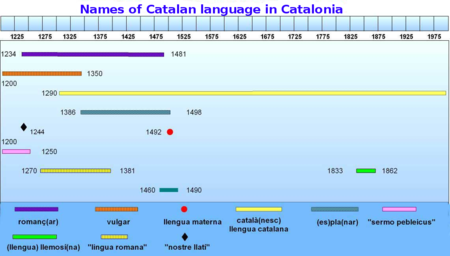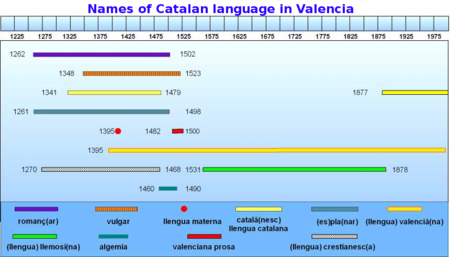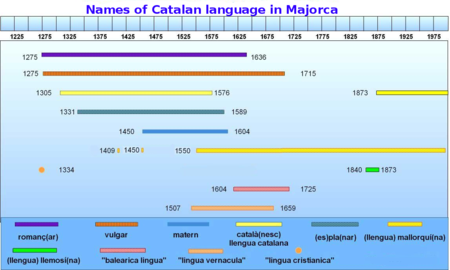- Names of the Catalan language
-
The first names, or glossonyms, of the Catalan language formed in a dialectal relation with Latin, in which Catalan existed as a variety. These names already expressed the relationship between the two languages (Tours Concilium, 813). New names that related Catalan to Rome (llengua romanana, romanç, nostre llatí) came about to dignify the Catalan language in the thirteenth century, though Latinists called it vulgar and most people, pla ('plain', 'understandable').
With the language expanding beyond Catalonia, names that indicated its place of origin were favored: catalanesc, català, llengua catalana. Likewise, the monarchy became associated with the language, which neutralized the political divisions of its territory. By the end of Middle Ages, Latin was less of a universal language, provoking Catalan to receive other names that remarked a local character and the political divisions of the time: llengua materna, mallorquí (in the Kingdom of Majorca), valencià (in the Kingdom of Valencia). Similarly, when Castile and Aragon were united in the fifteenth century, the range of the Catalan name was reduced to simply mean "from Catalonia" and confusion about the origin of the language led to the apparition of names such as llemosí (Limousin). Before the Renaixença, which revitalized Catalan-language culture, some unpopular terms such as llemosí-català, català i valencià, and bacavès (after balear-català-valencià) were created.
In the twentieth century, after two dictatorships (those of Miguel Primo de Rivera and Francisco Franco) persecuted the Catalan language, some attempted to boycott language normalization in Valencia and the Balearic Islands by creating a naming conflict. In Valencia, the violent pressure made it possible for the name llengua valenciana entered the Statute of Autonomy.[citation needed]
The negative consequences of the conflict for the linguistic normalization were intended to be solved by the end of the twentieth century with a new mixed name: català-valencià, and català-valencià-balear.
Since the persistence of the conflict, the universities of Valencia, Catalonia and the Balearic Islands have defended the name llengua catalana along with the legal synonym name of valencià.
See also
- Valencian language controversy
External links
- Zarko Muljačić, "Perché i glottonimi linguaggio italiano, lingua italiana (e sim.) appaiono per indicare «oggetti» reali e non soltanto auspicati moho piú tardi di altri termini analoghi che si riferiscono a vane lingue gallo e ibero-romanze?"
- Sobre la llengua dels valencians. informes i documents, Universitat de Valencia, Valènciam, 1998
- Llengua i cultura dels Borja a Roma. Els "catalani"
- A.Vila Francés i A. Vila Moreno, El nom històric de la llengua valenciana
- August Rafanell, El misteriós llemosí de la festa d'Elx: constants d'un discurs perifèric
- Josep Ballester, El feixisme i la cultura catalana al País Valencià a la postguerra: a propòsit d'un procés de folclorització i d'eliminació
- Joan Fuster, Qüestió de noms
- Documental "Del roig al blau"
- Dictamen de l'Acadèmia Valenciana de la Llengua sobre els principis i criteris per a la defensa de la denominació i l'entitat del valencià
- Organització pel Multilingüisme. Nosaltres que podem, dialoguem.
- Buidatge d’articles de l’Estat de la qüestió : La polèmica català/valencià
Further reading
- Antoni I. Alomar, «La llengua catalana com a patrimoni de les Balears des del punt de vista del passat», dins Societat Arqueològica Lul·liana, Actes del IV Congrés El nostre patrimoni cultural: El català, patrimoni de Mallorca, Palma, 1997, pàgs. 17-56.
- Josep Amengual i Batle, "La llengua del poble dins els sínodes mallorquins", Randa 6.
- Germà Colón i Domènech, La llengua catalana en els seus textos I, Curial Ed., Barcelona, 1978. p. 39-59, 60-71. ISBN: 84-7256-158-5.
- Germà Colón i Domènech, El español y el catalán, juntos y en contraste, Editorial Ariel , Barcelona, 1989, p. 19-32. ISBN: 84-344-8208-8.
- Germà Colón i Domènech, Estudis de filologia catalana i romànica, Institut Interuniversiari de Filologia Valenciana - Publicacions de l'Abadia de Montserrat, València/Barcelona, 1997, p. 185-194. ISBN: 84-7826-833-2.
- Germà Colón i Domènech, De Ramon Llull al Diccionari de Fabra. Acostament a les lletres catalanes, Fundació Germà Colón, Publicacions de l'Abadia de Montserrat, Barcelona, 2003, p. 229-242. ISBN: 84-8415-541-2.
- Antoni Ferrando, Consciència idiomàtica i nacional dels valencians, València, Universitat de València, València, 1980. ISBN: 8437001625
- Antoni Ferrando i Miquel Nicolás, Panorama d'història de la llengua, Tàndem Edicions, València, 1993. ISBN: 84-8131-038-7.
- Antoni Ferrando i Miquel Nicolás, Història de la llengua catalana, Universitat Oberta,Ed. Pòrtic, Barcelona, 2005, p. 105-107, 165-169, 251.254. ISBN: 84-9788-149-4.
- Rosalia Guilleumas, La llengua catalana segons Antoni Rubió i Lluch, Ed. Barcino, Barcelona, 1957. ISBN: 84-7226-475-0.
- Antoni Mas i Forners, «De nationes seu linguae a cuius regio eius lingua. Les demominacions gentilícies de la llengua a Mallorca durant l’edat mitjana», Homenatge a Guillem Rosselló Bordoy, Volum II, Palma, 2002. p. 585-606. ISBN: 84-95871-14-9.
- Josep Massot i Muntaner, «La consciència lingüística als segles XV-XVIII», Lluc, desembre de 1969, pàgs. 6-8; recollit dins Els mallorquins i la llengua autòctona, Curial, Barcelona, 11972, pàgs. 13-25. ISBN:
- Josep Massot i Muntaner, "Antoni M. Alcover i la llengua catalana", II Congrés Internacional de la Llengua Catalana, Publicacions de l'Abadia de Montserrat, Barcelona, 1985, p. 118-127.
- Manuel Sanchis Guarner, "La llengua dels valencians", Ed. Tres i Quatre, València, 1972. p. 2144.
- Pere Oliver i Domenge, La catalanitat de les Mallorques. Conferència llegida en la vetlla del 23 de març de 1916, en el Casal Catalanista de Sants «Els Segadors», Esquerra Republicana de Catalunya – Illes Balears i Pitiüses, Mallorca, 1993.
- Antonio Planas Rosselló, El proceso penal en el Reino de Mallorca, Miquel Font Ed., Palma, 1998. ISBN: 84-7967-067-3.
- August Rafanell (ed.), Un nom per a la llengua. El concepte de llemosí en la història del català, Vic/Girona, EUMO Editorial/Universitat de Girona, 1991. ISBN: 84-7602-804-0.
- August Rafanell Vall-llosera, El llemosinisme. Un estudi de les idees sobre la variació lingüística en la història de la llengua catalana, Publicacions de la Universitat Autònoma de Barcelona, Tesi Doctoral (microfitxa), Bellaterra: UAB, 1991.
- Mila Segarra, "Llengua i escriptura en la societat catalana medieval" dins Història de la cultura catalana I, Ed. 62, Barcelona, 1999, p.125-150. ISBN: 84-297-4544-0.
- Sobre la llengua els valencians. informes i documents, Universitat de Valencia, València, 1998.
Categories:
Wikimedia Foundation. 2010.



